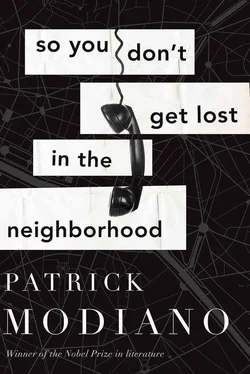TOWARDS THE END OF THE AFTERNOON, HE WAS surprised not to have received a phone call from Chantal Grippay. Yet she must have noticed that she had forgotten her black dress. He rang her mobile number, but there was no answer. After the signal, there was silence. You had reached the edge of a cliff beyond which there was nothing but empty space. He wondered whether the number was still functioning or whether Chantal Grippay might have lost her mobile. Or whether she was still alive.
As if by contagion, a doubt arose in his mind concerning Gilles Ottolini. He typed out on the keyboard of his computer: “Agence Sweerts, Paris”. No Sweerts agency in Paris, neither in the gare Saint-Lazare area nor in any other district. The supposed author of Le Flâneur hippique was merely a bogus employee of an imaginary agency.
He wanted to know if an Ottolini was listed in square du Graisivaudan, but among the names that featured at the eight numbers of the square, not a single Ottolini. In any case, the black dress was there, on the back of the sofa, proof that he had not been dreaming. He typed out, on the off-chance, “Silvy-Rosa. Fashion design. Rue Estelle. Marseille”, but all he obtained was: “Rosa Alterations, 18 rue du Sauvage, 68100 Mulhouse”. For the past few years, he hardly ever used this computer on which most of his research came to nothing. The rare people whom he would have liked to trace had succeeded in escaping the vigilance of this machine. They had slipped through the net because they belonged to another age and because they were not exactly saints. He remembered his father whom he hardly knew and who used to say to him in a soft voice: “I’d be a tough case for dozens of examining magistrates.” No trace of his father on the computer. Any more than of Torstel or Perrin de Lara whose names he had typed out on the keyboard the previous day, before Chantal Grippay arrived. In the case of Perrin de Lara, the usual phenomenon had occurred: a great many Perrins were displayed on the screen, and the night was not long enough to go through the entire list. Those whom he would have liked to hear from were often hidden among a crowd of anonymous people, or else behind a famous character who bore the same name. And when he typed out a direct question on the keyboard: “Is Jacques Perrin de Lara still alive? If so, give me his address”, the computer seemed incapable of replying and you could sense a certain hesitation and a certain embarrassment passing through the multiple wires that connected the machine to electrical sockets. Sometimes, you were dragged off on false trails: “Astrand” produced results in Sweden, and several people of this name were grouped together in the city of Gothenburg.
The weather was hot and this Indian summer would probably extend into November. He decided to go out instead of waiting in his study until sunset, as he usually did. Later on, when he returned, he would try to decipher with the aid of a magnifying glass the photocopies that he had read through too quickly the previous day. Perhaps in this way he would have the opportunity to learn something about Annie Astrand. He regretted not having asked her these questions when he had seen her again fifteen years after the Photomaton shop episode, but he had very soon realised that he would not receive any response from her.
Outside, he felt more carefree than he had on previous days. He may have been wrong to immerse himself in this distant past. What was the point? He had not thought about it for a number of years, and so eventually it seemed to him that he saw this period of his life through a frosted window. It allowed a vague clarity to filter through, but you could not make out the faces or even the figures. A glazed window, a sort of protective screen. Perhaps, thanks to deliberate forgetfulness, he had managed to protect himself from this past for good. Or else, it was time that had subdued its more intense colours and rough edges.
There, on the pavement, in the light of the Indian summer that lent the Paris streets a timeless softness, he once again had the feeling that he was floating on his back. He had not experienced this sensation since last year, and he wondered whether it might not be linked to the onset of old age. When he was very young, he had known those moments of semi-slumber when you allow yourself to drift — usually after being up all night — but today it was different: the sense of free-wheeling down a slope, when the motor has stopped. How far would you go?
He glided, swept along by a breeze and by his own weight. He bumped into pedestrians who were coming in the opposite direction and had not moved out of the way quickly enough as he passed by. He apologised. It was not his fault. Normally, he displayed far greater vigilance when he walked in the street, ready to change pavements if he saw someone in the distance whom he knew or who might accost him. He was aware that you very seldom met anyone you really had wanted to meet. Twice or three times in a lifetime?
He would happily have walked to rue de Charonne to take Chantal Grippay’s dress back to her, but he risked coming across Gilles Ottolini. And if he did? It would provide an opportunity to be better informed about the uncertain existence of this man. Chantal Grippay’s remark came back to him: “They want to make him redundant at the Sweerts agency.” Yet she must know that the Sweerts agency did not exist. And the book, Le Flâneur hippique , the copyright of which dated from before the war? Had Ottolini taken the manuscript to Éditions du Sablier in a former life and under a different first name? He, Daragane, deserved a few explanations about these matters, after all.
He had reached the arcades of the Palais-Royal. He had walked without any particular aim. But, in crossing the Pont des Arts and the courtyard of the Louvre, he was following a route that was familiar to him from his childhood. He walked along what is known as the Louvre des Antiquaires and he remembered the Christmas windows of the Grands Magasins du Louvre in the same spot. And now that he had paused in the middle of the Galerie de Beaujolais, as though he had reached the end of his walk, another memory came back to him. It had been buried away for so long and so deeply, far from the light of day, that it seemed new. He wondered whether it really was a memory or whether it was a snapshot that no longer belonged to the past, having detached itself like a free electron: his mother and he — one of the rare occasions when they were together — entering a shop that sold books and paintings, and his mother speaking to two men, one of whom was sitting at a desk at the back of the shop while the other stood with his elbow propped against a marble fireplace. Guy Torstel. Jacques Perrin de Lara. Frozen there, until the end of time. How could it be that on that Sun-day in autumn when he had returned from Le Tremblay with Chantal and Paul, in Torstel’s car, this name should not have reminded him of anything, any more than his visiting card did, despite the fact that the address of the shop was printed on it?
In the car, Torstel had even referred to “the house on the outskirts of Paris” where, as a child, he had seen him at Annie Astrand’s house. He, Daragane, had stayed there for almost a year. At Saint-Leu-la-Forêt. “I remember a child,” Torstel had said. “That child was you, I suppose. .” And Daragane had replied to him curtly, as though this was nothing to do with him. It was the Sunday when he had begun to write Le Noir de l’été after Torstel had dropped him at square du Graisivaudan. And not for a moment had he had the presence of mind to ask him whether he remembered the woman who lived in this house, at Saint-Leu-la-Forêt, “a certain Annie Astrand”. And whether he happened to know what had become of her.
Читать дальше












